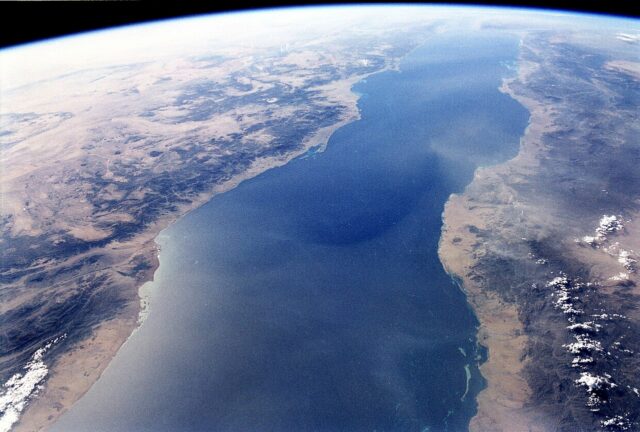Beyond Trade Routes: Geopolitical Chess in the Red Sea

Geopolitical Report ISSN 2785-2598 Volume 38 Issue 9
OSINT Team
The Red Sea, historically a vital trade route, is now a focal point for complex geopolitical dynamics driven by major global powers and regional actors. China’s Belt & Road Initiative (BRI) has spurred significant infrastructure investments and military presence, amplifying competition with the United States and other stakeholders.
Recent conflicts in Gaza and Sudan have further intensified tensions, affecting the Red Sea’s security and global trade routes. This report offers a comprehensive analysis of these dynamics, evaluates associated risks, and explores potential future scenarios.
Key Findings
- Expanding Chinese Influence. The Red Sea is witnessing a notable expansion of China’s BRI, marked by substantial infrastructure investments and a growing military footprint. Key developments include the rehabilitation and enlargement of Port Sudan’s container terminal and Egypt’s substantial expansion of the Berenice naval base.
- Impact of Regional Conflicts. Ongoing conflicts, particularly the Israeli-Palestinian conflict and unrest in Sudan, have spilled over into the Red Sea. Houthi rebels in Yemen are targeting merchant and naval vessels, posing significant threats to maritime security in the region. These conflicts also have broader implications, impacting the strategic goals of Saudi Arabia and other regional players.
- Strategic Challenges of IMEC. The India-Middle East-Europe Economic Corridor (IMEC), introduced as a counter to BRI, presents a strategic challenge but faces considerable obstacles. Despite its potential to reshape regional connectivity and economic dynamics, financing challenges, and the need for normalisation in the region, particularly between Saudi Arabia, the United Arab Emirates (UAE), and Israel, pose significant hurdles.
Background Information
The Red Sea has developed into a geopolitical hotspot, attracting the attention of major global powers and regional players. China’s assertive presence through the BRI, coupled with military build-ups, conflicts in Gaza and Sudan, and the emergence of alternative economic corridors like IMEC, underscores the strategic importance of this maritime corridor.
Red Sea: A Geopolitical Analysis
The intricate interactions between global and regional powers shape the geopolitical landscape of the Red Sea. China’s BRI investments have triggered responses from the United States, Egypt, the UAE, and Saudi Arabia, leading to military build-ups and strategic alliances.
The conflicts in Gaza and Sudan add a layer of complexity, affecting maritime security and posing direct challenges to the stability of the region.
China’s ambitions to secure key trade routes and establish strategic footholds, coupled with the United States’ efforts to maintain influence, have created a delicate balance in the Red Sea.
The UAE’s strategic positioning through port developments and control of key locations, such as Bab al-Mandeb and the Suez Gulf, adds to the regional power dynamics.
The IMEC initiative, while holding promise, faces challenges related to financing and regional normalisation. The success of this alternative corridor depends on overcoming these hurdles and navigating the intricate political landscape of the Red Sea region.
Read more | Geopolitical Risk in the Red Sea |
Risk Assessment
The Red Sea faces heightened risks because of ongoing conflicts, increasing military activities, and potential geopolitical escalations. Key risks include disruptions to vital trade routes, security threats to critical infrastructure, and tensions among major powers vying for influence in the region. The instability in Gaza and Sudan poses a direct threat to the security and stability of the Red Sea.
Scenarios Analysis
- Continued Conflict. Escalation of conflicts in Gaza and Sudan could lead to heightened military activities, jeopardising the security of Red Sea trade routes and regional stability.
- Regional Cooperation. Diplomatic efforts aimed at de-escalating tensions and fostering regional cooperation, particularly through initiatives like IMEC, may contribute to stability and improved economic connectivity.
- China’s Dominance. If China continues its expansion through BRI, it could reshape the geopolitical landscape of the region, potentially altering the balance of power and influencing the interests of other major players in the region.
Conclusion/Recommendations
Given the strategic significance of the Red Sea, stakeholders, including major global powers and regional actors, must engage in sustained diplomatic dialogue and cooperative efforts to ensure stability.
Companies engaged in transportation, trade, and logistics should diligently observe regional development and local dynamics to evaluate the geopolitical risks associated with the Red Sea and comprehend the potential impact of local issues on their business operations.
The evaluation of the situations in the Gaza Strip, Sudan, and Yemen is of strategic significance in assessing the security and navigational conditions of the Red Sea. This assessment is important because of the ongoing tensions between local key players and international actors.
Strengthening maritime security, resolving conflicts, and actively supporting initiatives like the IMEC can contribute to a more secure and prosperous Red Sea region. Taking proactive steps is necessary to manage risks and take advantage of the economic opportunities of this important maritime route during changing geopolitical circumstances.
For those with an interest in acquiring comprehensive insights into the geopolitical dynamics of the Red Sea, we encourage you to reach out to our team by sending an email to info@specialeurasia.com. We are poised to facilitate an assessment of the opportunity for you to obtain a meticulously crafted and specialised report tailored to your intelligence needs.
Read more | Is China replacing the United States in the Middle East? |
